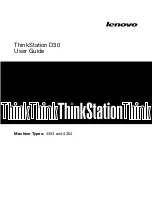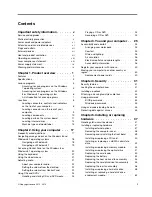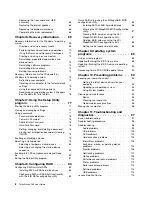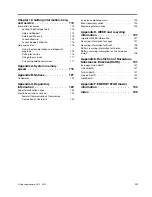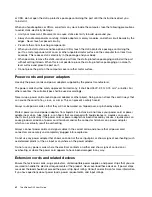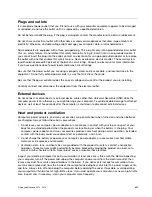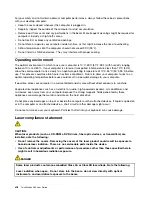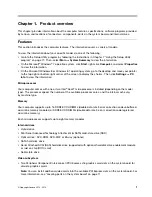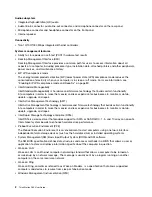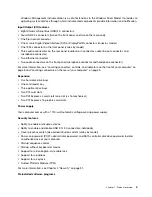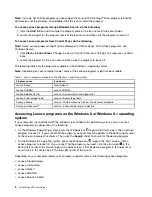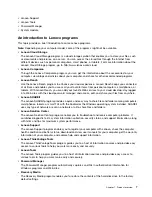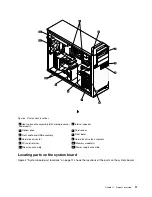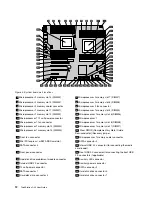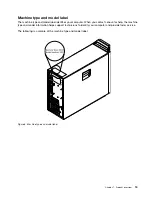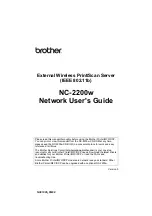
Audio subsystem
• Integrated high-definition (HD) audio
• Audio line-in connector, audio line-out connector, and microphone connector on the rear panel
• Microphone connector and headphone connector on the front panel
• Internal speaker
Connectivity
• Two 10/100/1000 Mbps integrated Ethernet controllers
System management features
• Ability to store power-on self-test (POST) hardware test results
• Desktop Management Interface (DMI)
Desktop Management Interface provides a common path for users to access information about all
aspects of a computer, including processor type, installation date, attached printers and other peripherals,
power sources, and maintenance history.
• ErP LPS compliance mode
The energy-related products directive (ErP) lowest power state (LPS) compliance mode reduces the
consumption of electricity when your computer is in sleep or off mode. For more information, see
“Enabling ErP LPS compliance mode and Deep Sx” on page 80.
• Intel Standard Manageability
Intel Standard Manageability is hardware and firmware technology that builds certain functionality
into computers in order to make them easier and less expensive for businesses to monitor, maintain,
update, upgrade, and repair.
• Intel Active Management Technology (AMT)
Intel Active Management Technology is hardware and firmware technology that builds certain functionality
into computers in order to make them easier and less expensive for businesses to monitor, maintain,
update, upgrade, and repair.
• Intel Rapid Storage Technology enterprise (RSTe)
Intel RSTe is a device driver that provides support for SATA or SAS RAID 0, 1, 5, and 10 arrays on specific
Intel chipset system boards to enhance hard disk drive performance.
• Preboot Execution Environment (PXE)
The Preboot Execution Environment is an environment to start computers using a network interface
independent of data storage devices (such as the hard disk drive) or installed operating systems.
• System Management (SM) Basic Input/Output System (BIOS) and SM software
The SM BIOS specification defines data structures and access methods in a BIOS that allows a user or
application to store and retrieve information specific about the computer in question.
• Wake on LAN
Wake on LAN is an Ethernet computer networking standard that allows a computer to be turned on
or woken up by a network message. The message is usually sent by a program running on another
computer on the same local area network.
• Wake on Ring
Wake on Ring, sometimes referred to as Wake on Modem, is a specification that allows supported
computers and devices to resume from sleep or hibernation mode.
• Windows Management Instrumentation (WMI)
2
ThinkStation D30 User Guide
Summary of Contents for ThinkStation D30
Page 1: ...ThinkStation D30 User Guide Machine Types 4353 and 4354 ...
Page 6: ...iv ThinkStation D30 User Guide ...
Page 12: ...x ThinkStation D30 User Guide ...
Page 28: ...16 ThinkStation D30 User Guide ...
Page 45: ...Figure 8 Installing a padlock Chapter 4 Security 33 ...
Page 48: ...36 ThinkStation D30 User Guide ...
Page 80: ...68 ThinkStation D30 User Guide ...
Page 94: ...82 ThinkStation D30 User Guide ...
Page 104: ...92 ThinkStation D30 User Guide ...
Page 130: ...118 ThinkStation D30 User Guide ...
Page 138: ...126 ThinkStation D30 User Guide ...
Page 142: ...130 ThinkStation D30 User Guide ...
Page 146: ...134 ThinkStation D30 User Guide ...
Page 150: ...138 ThinkStation D30 User Guide ...
Page 151: ......
Page 152: ......

